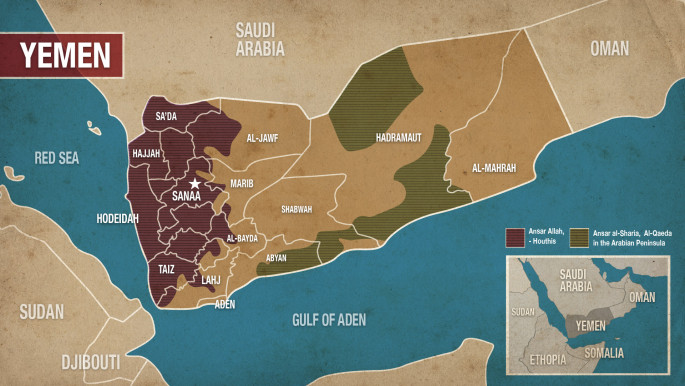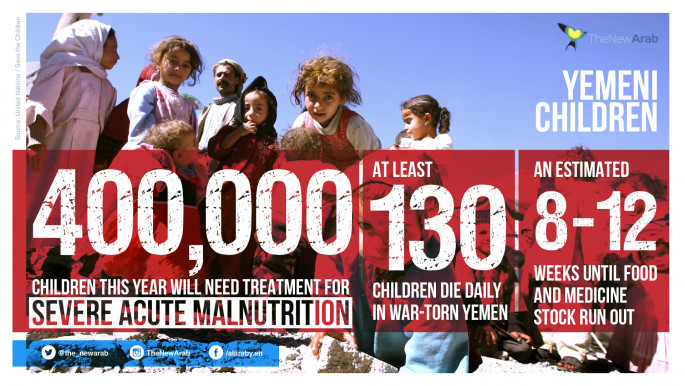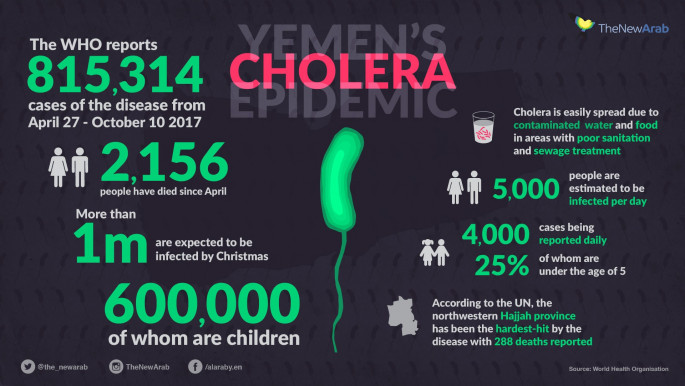Civilians desperate for ceasefire in Yemen
Civilians desperate for ceasefire in Yemen
Clashes between Yemen's warring factions have recently intensified, leaving civilians at greater risk from the country's ongoing conflict, which has already destroyed millions of lives.
4 min read
Children are traumatised; vital aid cannot reach injured Yemenis [Getty]
Clashes between Yemen's warring factions have recently intensified, leaving civilians at risk from the country's ongoing conflict, which has already destroyed millions of lives.
Yemeni children are traumatised while vital aid cannot reach the injured, and people cannot flee contested areas. Humanitarian NGOs have been urging both sides to immediately agree a ceasefire.
The rceent death of Yemen's former President Ali Abdullah Saleh at the hands of Houthi forces sparked an escalation in the fighting. President Abdrabbuh Mansour Hadi's government, backed by the Saudi-led coalition, subsequently ordered troops to push harder into Houthi territory to claim the rebel-held capital, Sanaa.
"The death of Ali Abdullah Saleh creates a dangerous power vacuum in Yemen that could lead to further escalation of violence - with horrific implications for the Arabian Peninsula country's worsening humanitarian disaster. For all of Saleh's crimes against the Yemeni people, the former president was in a unique position to promote peace and stability in Yemen as an influential interlocutor," Giorgio Cafiero, CEO at Gulf State Analytics, told The New Arab.
Yemeni children are traumatised while vital aid cannot reach the injured, and people cannot flee contested areas. Humanitarian NGOs have been urging both sides to immediately agree a ceasefire.
The rceent death of Yemen's former President Ali Abdullah Saleh at the hands of Houthi forces sparked an escalation in the fighting. President Abdrabbuh Mansour Hadi's government, backed by the Saudi-led coalition, subsequently ordered troops to push harder into Houthi territory to claim the rebel-held capital, Sanaa.
"The death of Ali Abdullah Saleh creates a dangerous power vacuum in Yemen that could lead to further escalation of violence - with horrific implications for the Arabian Peninsula country's worsening humanitarian disaster. For all of Saleh's crimes against the Yemeni people, the former president was in a unique position to promote peace and stability in Yemen as an influential interlocutor," Giorgio Cafiero, CEO at Gulf State Analytics, told The New Arab.
 |
|
| [Click to enlarge] |
"Yemen's internationally recognised government and the Gulf Cooperation Council (GCC) states backing it have sought to take advantage of Saleh's death as an opportunity to rally the Yemenis against the country's Iranian-backed rebels."
Army officials and local authorities requesting anonymity declared at the weekend that government forces had seized al-Khoukha, a city on the Red Sea coast. Al-Khoukha lies between the Houthi-held city of Hodeida and government-controlled Mocha. Some 20 Houthi fighters were reportedly killed in the clashes, while 11 were captured. Houthi forces had previously captured sections of the Red Sea coastline.
Houthi forces have meanwhile upped their efforts to retain Sanaa.
Saudi Arabia supports the Hadi government with an aerial bombing campaign, which has destroyed much of Yemen's vital infrastructure and caused immense civilian harm.
The International Committee for the Red Cross (ICRC) warns that more Yemeni civilians are likely to be caught up in the fighting, and therefore urged all warring parties to refrain from hostilities in civilian areas.
"The situation is very difficult for people in contested areas. We are very concerned by the challenges for civilians to move or escape from fighting areas, as well as the limited ability to drop food, medical and other essential supplies to people in the area," Sanel Bajramba, spokesperson for ICRC, told The New Arab.
At least 234 Yemenis have been killed, and 486 injured - most of them severely - since Wednesday 29 November, reported the ICRC.
"Fighting along the Red Sea coast is reported to be approaching densely inhabited urban areas. This is happening against the backdrop of a catastrophic humanitarian situation and a Yemeni population brought to its knees after almost three years of conflict," said Robert Mardini, who directs the ICRC's operations in the Near and Middle East.
"It is also important to remind that all persons captured in relation to the ongoing hostilities must be treated humanely."
Bajramba added that the Red Cross was trying to deliver fuel supplies to Jumhouri and Al-Kuwait hospitals in the area, which have fun out of fuel for generators - now the only source of electricity.
The charity also says that the region's vital infrastructure, including water and electricity networks, could be further deteriorated, leaving more civilians vulnerable to the country's ongoing cholera epidemic - now one of the worst outbreaks in recorded history.
Save the Children has also called for an immediate ceasefire in Sanaa, as children in the city and in nearby districts are cut off from receiving support and at risk of being killed or injured from the fighting.
The NGO reports that Sanaa's children are traumatised by the sounds of bombs and war, being trapped under the most intense bout of hostilities since the war began in March 2015.
Ambulances reportedly cannot reach the area to help the injured, while pregnant women cannot safely reach hospitals.
"This continued escalation of violence is deeply concerning. Children are being killed and injured, and schools and hospitals are coming under attack. The fighting is pushing up the prices of basic goods even higher and preventing aid agencies and health workers from reaching vulnerable families with life-saving help in some areas," Caroline Anning, Save the Children spokesperson, told The New Arab.
"We are calling on all warring parties to protect civilians and asking the international community to urgently take steps to calm the situation, including through action at the UN Security Council."
Giorgio Cafiero warns that humanitarian aid cannot successfully reach civilian areas while the conflict persists. Chances of a ceasefire have only diminished amid the increased fighting after Saleh's death, said the analyst.
The Saudi-led blockade on Yemeni ports further restricts vital aid from entering the country and reaching desperate civilians, even though the coalition says the embargo aims to stop weapons reaching Houthi forces.
US President Donald Trump recently told Saudi Arabia to ease the blockade on Yemen and allow in humanitarian aid.
The United States is still the kingdom's biggest weapons supplier, signing an arms deal in May worth around $110 billion. Critics often say this support enables Saudi Arabia to carry out its assaults on Yemen.
Army officials and local authorities requesting anonymity declared at the weekend that government forces had seized al-Khoukha, a city on the Red Sea coast. Al-Khoukha lies between the Houthi-held city of Hodeida and government-controlled Mocha. Some 20 Houthi fighters were reportedly killed in the clashes, while 11 were captured. Houthi forces had previously captured sections of the Red Sea coastline.
Houthi forces have meanwhile upped their efforts to retain Sanaa.
Saudi Arabia supports the Hadi government with an aerial bombing campaign, which has destroyed much of Yemen's vital infrastructure and caused immense civilian harm.
The International Committee for the Red Cross (ICRC) warns that more Yemeni civilians are likely to be caught up in the fighting, and therefore urged all warring parties to refrain from hostilities in civilian areas.
"The situation is very difficult for people in contested areas. We are very concerned by the challenges for civilians to move or escape from fighting areas, as well as the limited ability to drop food, medical and other essential supplies to people in the area," Sanel Bajramba, spokesperson for ICRC, told The New Arab.
At least 234 Yemenis have been killed, and 486 injured - most of them severely - since Wednesday 29 November, reported the ICRC.
 |
"Fighting along the Red Sea coast is reported to be approaching densely inhabited urban areas. This is happening against the backdrop of a catastrophic humanitarian situation and a Yemeni population brought to its knees after almost three years of conflict," said Robert Mardini, who directs the ICRC's operations in the Near and Middle East.
"It is also important to remind that all persons captured in relation to the ongoing hostilities must be treated humanely."
Bajramba added that the Red Cross was trying to deliver fuel supplies to Jumhouri and Al-Kuwait hospitals in the area, which have fun out of fuel for generators - now the only source of electricity.
The charity also says that the region's vital infrastructure, including water and electricity networks, could be further deteriorated, leaving more civilians vulnerable to the country's ongoing cholera epidemic - now one of the worst outbreaks in recorded history.
Save the Children has also called for an immediate ceasefire in Sanaa, as children in the city and in nearby districts are cut off from receiving support and at risk of being killed or injured from the fighting.
The NGO reports that Sanaa's children are traumatised by the sounds of bombs and war, being trapped under the most intense bout of hostilities since the war began in March 2015.
 |
|
| [Click to enlarge] |
Ambulances reportedly cannot reach the area to help the injured, while pregnant women cannot safely reach hospitals.
"This continued escalation of violence is deeply concerning. Children are being killed and injured, and schools and hospitals are coming under attack. The fighting is pushing up the prices of basic goods even higher and preventing aid agencies and health workers from reaching vulnerable families with life-saving help in some areas," Caroline Anning, Save the Children spokesperson, told The New Arab.
"We are calling on all warring parties to protect civilians and asking the international community to urgently take steps to calm the situation, including through action at the UN Security Council."
Giorgio Cafiero warns that humanitarian aid cannot successfully reach civilian areas while the conflict persists. Chances of a ceasefire have only diminished amid the increased fighting after Saleh's death, said the analyst.
The Saudi-led blockade on Yemeni ports further restricts vital aid from entering the country and reaching desperate civilians, even though the coalition says the embargo aims to stop weapons reaching Houthi forces.
US President Donald Trump recently told Saudi Arabia to ease the blockade on Yemen and allow in humanitarian aid.
The United States is still the kingdom's biggest weapons supplier, signing an arms deal in May worth around $110 billion. Critics often say this support enables Saudi Arabia to carry out its assaults on Yemen.
Jonathan Fenton-Harvey is a freelance journalist who has contributed to outlets such as The New Arab, Counterpunch, Middle East Eye and Tribune Magazine.
Follow us on Twitter: @The_NewArab



